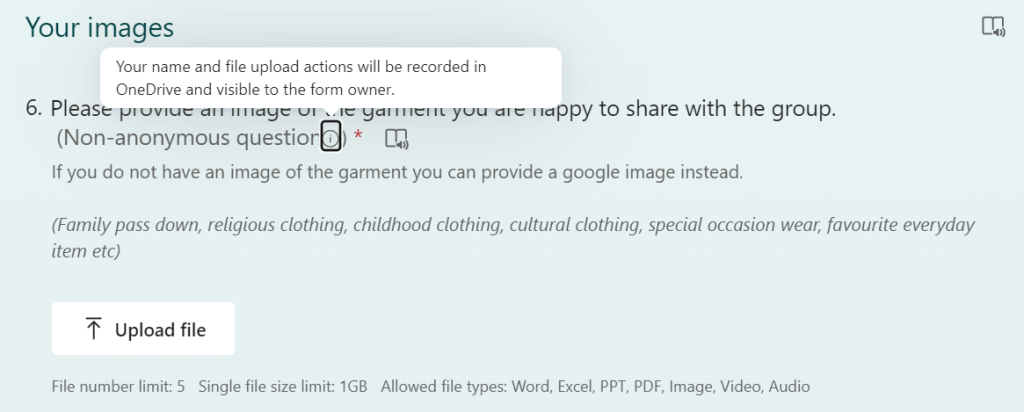When developing a consent form for the research project, I considered how the information obtained would affect my approach to the workshop. Considering that my research is focused on embedding social theories and object based learning, I constantly reflected on how my personal bias could show up.
- Can students arrive with images/artefacts on the day, or should this be sent beforehand?
- Is it necessary to know who sent each image? How will this affect my approach to each student?
- What information is essential in order for students to take part?
It is important that students understand exactly what they are consenting to. (BERA 2018, p.9) Ensuring that students are aware of what will be asked of them during the workshop, how images will be used and what information will be used beyond the workshop for research purposes.
Initially I had planned to receive consent at two stages. The first being an anonymous sign up form allowing students to upload images of their artefacts without personal identifiers. This would require consent to display student images during the workshop. The second, on arrival to the workshop. However, this plan quickly changed as Microsoft Forms does not allow anonymous image upload.

This meant I had to receive personal identifiers. Considering images are so personal, I also realised that regardless of not having identifiers such as name, contact etc, seeing an image of a person would already begin to give me clues on the persons identity. Within the dual role of researcher and teacher it will be important for me manage my own bias and facilitate conversation without my pushing my own thoughts or ideologies on participants. (Hahn Tapper, A. 2013, p.415)
At this point I realised that it would be more beneficial to combine my sign up form, participation consent and research information into one form. This would allow students to fully understand what they are consenting and provide opportunity for students to withdraw if they choose to. It would also be less complicated or taxing for students, and myself. It provides opportunity for students to read through and complete at their own leisure whilst not taking up time within the workshop.
Another aspect I considered when creating the form is the phrasing of questions. I had concerns that students may provide images with non-consenting participants and was not sure how to mitigate that. Initially I had planned to edit/block out additional parties but felt that this in turn may impinge on students wishes. Instead I rephrased the question to ‘provide an image you are happy to share with the group’. This allows students to reflect on whether they are comfortable sharing an image which may be personal, sensitive and/or have other participants and to edit accordingly.
Please see the full sign up & (UPDATED) consent form here: https://forms.office.com/e/cR9gYRYcP5
BERA (2018) Ethical Guidelines For Educational Research. Fourth Edition. London: British Education Research Association (Accessed 25 July 2023)
Hahn Tapper, A.J. (2013) ‘A Pedagogy of Social Justice Education: Social identity theory, intersectionality, and empowerment’. Conflict Resolution Quarterly. Available at: https://aspireonline.org/aspire2016/wp-content/uploads/sites/12/2016/10/A-Pedagogy-of-Social-Justice-Education.pdf (Accessed 22 June 2023)
